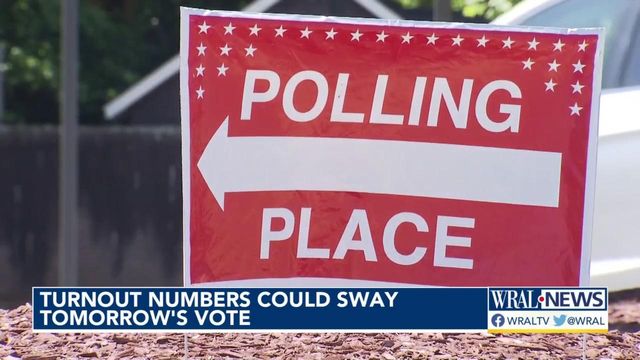Few Wake County voters are participating in Tuesday's election. Why you should care
Of the estimated 625,000 residents able to vote in the Democratic primary for the Wake County sheriff's election, a pair of Cary Town Council contests or some combination of the three races,10,241 people had voted by Monday afternoon.
Posted — UpdatedOf the estimated 625,000 residents able to vote in the Democratic primary for the Wake County sheriff’s election, a pair of Cary Town Council contests or some combination of the three races,10,241 people had voted by Monday afternoon.
Wake County Board of Elections Director Gary Sims said the unofficial count of early and mail-in votes received thus far is par for the course in a non-presidential election year.
“For us, it's just disappointing,” Sims said. “You really do all of this to help people get out and vote. It's just that some people just choose to vote once every four years. That is unfortunate, but again, it’s reality.”
Chris Cooper, a Western Carolina University political scientist who tracks North Carolina election data, said the low level of turnout for the sheriff’s race reflects limited awareness and interest from voters when higher-profile candidates are not also on the ballot. It’s nothing new, he said.
This year, the second Democratic primary for Wake County Sheriff has generated 12% of the turnout as the May 17 election. Cooper said he expects participation to at least double when factoring in Election Day ballots, bringing it in line with the 2014 turnout.
Cooper attributes the sizable dropoff between the first and second primaries to confusion over the number of elections in North Carolina within a short period of time.
“If the voters aren't turning out, I think that is a signal—maybe a signal of apathy, but it's also a signal of confusion,” Cooper said. “It is possible that somebody in the state of North Carolina could have to vote in the first primary, the second primary, a municipal election and also the general election. So in the course of about half a year, we're talking about four potential elections. That's a lot to keep track of for a political scientist, much less somebody who doesn't get paid to think about this all day, every day.”
Cooper believes the state should rethink its system so a greater number of voters decide party winners.
“It draws a lot of questions about how we run democracy in the state of North Carolina,” Cooper said. “Most of the states in our country don't actually have runoff elections. This is a Southern phenomenon in many ways. … Whether we should still have them today, given the low levels of turnout, I think should be a question that we should be debating more as a state than we currently are. This is a choice we're making, and, ultimately, these party primaries can be decided by a narrow slice of a narrow slice of the electorate.”
• Credits
Copyright 2024 by Capitol Broadcasting Company. All rights reserved. This material may not be published, broadcast, rewritten or redistributed.






